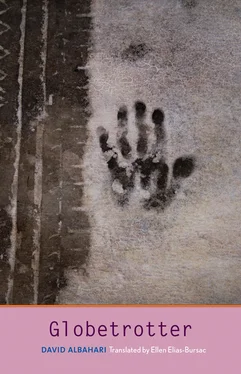Just then Ivan Matulić’s grandson came out of the bathroom, ashen and rumpled, and just in case, though it was obvious that he was spent, I moved my leg to the side. He raised the bottle, held it up to the night light to gauge how full it was, said that there were two fingers left, one for each of us, he said, and tipped back the bottle and drank down his finger of whiskey. Then I drank my finger’s worth, and then for ages I held the upside-down bottle over my outspread palm, from which I licked the last drops. I put the bottle down on the table and peered at it, and that is the last scene I remember; it was one of the ones that was going on in total silence, though I am certain that somewhere behind me Daniel Atijas was snoring steadily. I woke up in my room on the floor by the bed, fully clothed. My mouth was dry, my lips chapped and crusty, and with every movement, even the slightest, my head threatened to roll off my neck. I do not know how I got to my feet and made it to breakfast, but to my astonishment Daniel Atijas was already there. He was drinking coffee and eating toast, spread with a thin layer of margarine. He would like to have someone tell him, he said, how long a person can go on remembering a country once it is no longer there. Austria-Hungary, for instance, he said — is there anyone left who remembers it? Is there anyone who misses it still? Not as a historical fact, he said, but as a genuine country or, better yet, he said, a country which had been like a father for somebody, or like a mother, either way? He assumed they would, one day, think of his country that way, too, a curiosity of history, an entity defying historical inevitability, a stage created for great and small wartime events, only no one, he said, will speak of the feelings that used to stir in people.
No one cares. People hardly have time for their own feelings, he said, let alone for someone else’s, and least of all for the feelings of someone who does not know what he is feeling, for he doesn’t know what to relate those feelings to or whether he’d even dare to show them at all, since we all know what people think about those who insist on clinging to feelings that differ from other people’s, who are not prepared to accept the new reality, and thereby, he said, are forever reminding others, too, of a reality which maybe never should have been changed after all. He wouldn’t want, he said, for me to think he was the type of person who suffers from irrational grief for something that is not there; he wasn’t grieving for what was lacking, he said, but for what could have been. He knew, he said, that this was only a trick, a ruse he used to bolster his spirits, which, in his case, he said, was another name for reason, but there were moments when it was only by hook or by crook, he said, that he kept going. And besides, he was well aware that prowess lay not in finding, he said. True prowess lay in losing again what had been found, whatever one had sought for a long time, but, this time, losing it the right way, as Nietzsche had written for his Zarathustra — or was it in another book? he said. Nietzsche’s or Kierkegaard’s? Who knew, there were so many, one couldn’t keep track of them all, and for years now, he said, he had been thinking it would be best, though he himself was a writer, to read only one book per lifetime, and even that, he said, might be overdoing it.
Yes, now that he thought about it, he said, a story, one of Borges’s, for instance, or, why not, a poem, one of Rilke’s elegies, say, would do nicely, especially a Rilke, none of which can ever be plumbed, no matter how many times we read it. I replied that the same could be said for paintings, that there were paintings that could replace entire galleries, I said, and that sometimes it would be enough, or, perhaps, better, I said, to look at this one painting, one of Bosch’s canvases or a Dürer graphic, for instance, and not burn oneself out by traipsing through the entire museum, especially since museums are getting larger and their impact is therefore waning, for no one has the stamina to see everything that is on show. And when we stop and think about what will never be shown, said Daniel Atijas, what is stowed away in museum warehouses, only then, it seemed to him, are we forever condemned, he said, to a fragmented being and a fragmented world, to a life that unfolds by sidestepping life. He hastened to add that this probably sounded like the words of an embittered or disappointed person and that he most certainly did not see himself that way, but it was difficult where he lived, given his predicament, to preserve a sense of composure, and even more so, he said, his buoyancy and energy. Where everything was at a standstill, he said, where life was like sludge, everyone was falling apart, no matter how much they were trying to avoid it, to escape the general entropy, by sealing themselves into a hermetic space or in silence — a fitting choice, he said, for a writer. Several years he spent in silence, but he still felt, he said, the moral filth, so sometimes in the shower he would scrub himself for hours in a vain attempt to scrape off the stain he’d picked up from others.
He had always felt, he said, that every person is obliged to do all he can do to stand up to moral depravity, but he also felt, he said, that each of us must take the measure of this obligation and decide how to mount their own opposition, for only that way, he said, by bypassing protocol, can morals be defended. There are things to address first in the human soul, he said, and only afterward can we take the barricades into the streets. However, such an attitude had placed him in a situation in which he could never entirely satisfy anyone, for introversion, he said, like every form of silence, can be read two ways, as support or as reproach, meaning that recently he had been forced to put up with pressures from various quarters and to face down demands that he voice his views in public. His whole life, he said, he had been mounting a poetic of silence, and now they were calling for noisy words, and in the noise, he said, he simply could not find his bearings. Someone had once told him that his country, his former country, he should call it, was a botched experiment, so it was to be expected that the country would blow up at some point, as happens, he said, with badly mixed and highly volatile chemical compounds, where one drop too many was enough to blow up an entire lab. This comment deeply insulted him, he said, because he had never, not even now, felt like a lab rat or a guinea pig; he breathed life in deeply, just as people did anywhere. I told him I understood him, for there were times when I was overwhelmed by the feeling that the country where I was living was nothing more than an experiment — an experiment, I said, for which there were no guarantees of success.
When I said that I wasn’t thinking of Quebec, but of the other parts of the country, the western provinces in particular, which had never conformed to the confederation. And besides, I said, this confederation claimed the equality of its members, while actually it was always asymmetric. The east overshadowed the west, I said, and always they were trying to avoid finding themselves in the middle, and always a supernatural sense for equilibrium was needed to govern such a country, which most politicians, of course, never mustered. Daniel Atijas said he understood me now because if he had been telling my story before, now I was telling his, which only shows, he added, that we can never hope for anything good from history, especially from its repetitions. It’s a lucky thing, I said, that the history of his country cannot repeat itself here in its fullness, that there are variations in the repetition, which are essentially the result of an assortment of differences, including different views on society and the world, different frames of mind, religious beliefs, ethnic prejudices, and so forth. Daniel Atijas was surprised. He even said that he could not believe his ears, and to reinforce this he jiggled each ear, first the right, then the left, with a finger. There’s nothing to be done about it, he said. It has nothing to do with war; all this showed was that I had no idea what war really is, and that I still entertained romantic notions about war, and that he wouldn’t be surprised if, like Heraclitus, I believed that war was the father of all things, the cause and creator of change. Nothing could be further from the truth, said I, least of all the thought that politicians determine when a war begins and how it will go.
Читать дальше







![David Jagusson - Fesselspiele mit Meister David [Hardcore BDSM]](/books/486693/david-jagusson-fesselspiele-mit-meister-david-har-thumb.webp)




